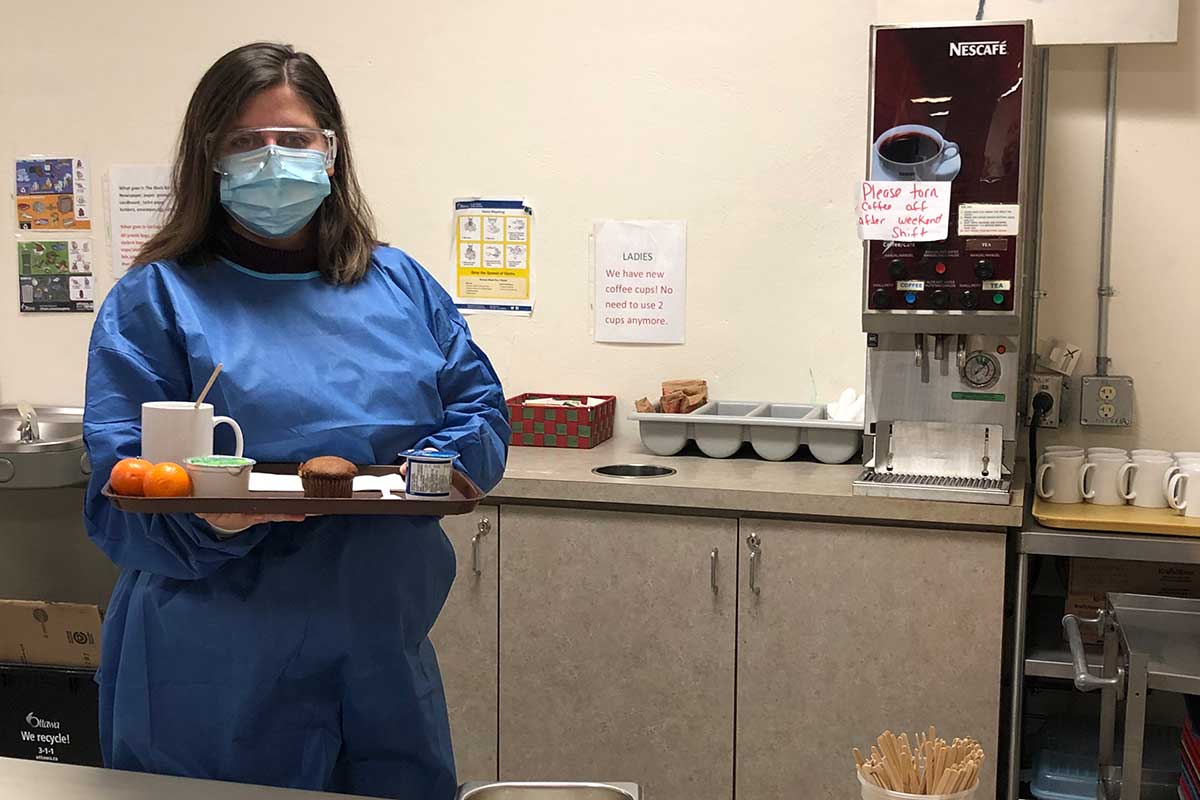This winter’s second wave of the pandemic has challenged the day programs of the Community Ministries in Ottawa as never before.
The integrated services of St Luke’s Table, The Well and Centre 454 are producing 260 hot meals a day out of a single kitchen at The Well in the basement of St. John the Evangelist on Elgin Street.
St. Luke’s Table continues its drop-in services in the church at 760 Somerset Street West while renovations are under way downstairs to add showers and laundry facilities. The renovations are the first step in implementing a new post-pandemic vision of service.
The integrated staff have increased from 22 to 30 to cope with demand at all locations because of pandemic-related hardships. While they are front-line workers the staff are not eligible for vaccination until the spring.
Hours of service have been extended at all three locations: from 3:30 p.m. to 9 p.m. six days a week at St. Luke’s; from five to seven days a week at Centre 454 and from five to six days a week at The Well.
Then there’s the direct ongoing threat of the pandemic itself. An outbreak of COVID-19 in the shelter system caused concern at the end of January as some shelter residents visit Centre 454. Positive tests have risen at a concerning rate in city shelters.
“We are really cautious, and we have put strict protocols in place,” says Rachel Robinson, executive director of the day programs. The protocols include surveillance testing for COVID-19 and self-isolation.
The Well’s kitchen staff are supported by five intern assistants from the Indigenous Wabano Centre on Montreal Road. The kitchen turns out 100 meals daily for delivery to the City’s warming centre at Tom Brown Area, where the day programs are partnering with the city to provide food services. Another 100 meals are sent to St. Luke’s and 60 stay at The Well. These are hot meals, distributed for lunchtime consumption. Food is also being prepared for the first time at Centre 454 where another two interns are helping.
The food budget last year doubled to $200,000 for the first time, a figure likely to be matched or exceeded this year.
In addition, the day programs distribute up to 100 meals daily from Food for Thought and the Ottawa Community Food Partnership, mainly for evening consumption. Food for Thought is a volunteer-based team that supplies hot meals to those unable to cook for themselves. St Luke’s Table is a member of the Ottawa Community Food Partnership, a network of emergency food providers.
By the spring, St. Luke’s expects renovations will be completed on renovations to add shower and laundry facilities and accessible washrooms. Funding of $300,000 from provincial COVID-19 relief and the city’s capital community program has allowed St Luke’s to close a key service gap that has been exacerbated by the pandemic.
Next up will be kitchen renovations. When the pandemic is under control St. Luke’s plans to add a “community kitchen.” While there will always be a need to prepare meals for on-site consumption, there will be an added emphasis on teaching cooking skills. With help, people will cook on-site and have the choice of taking their own meals home. This will be possible thanks to an enlarged kitchen with two or three workstations.
The kitchen project is dependent on fundraising. But a successful campaign last year has put $75,000 into a capital reserve earmarked for the job. Another major capital campaign is scheduled to begin in the spring.
In addition to food service, St Luke’s Table offers social, recreational and counseling services. The Well focuses on the needs of women and children, offering showers, laundry, support and computer access. Centre 454 is a drop-in place offering support and social and recreational services to the homeless and those precariously housed. All are Community Ministries of the Anglican Diocese of Ottawa.


Saint Mary’s Church, Westmeath — Deanery of the Northwest